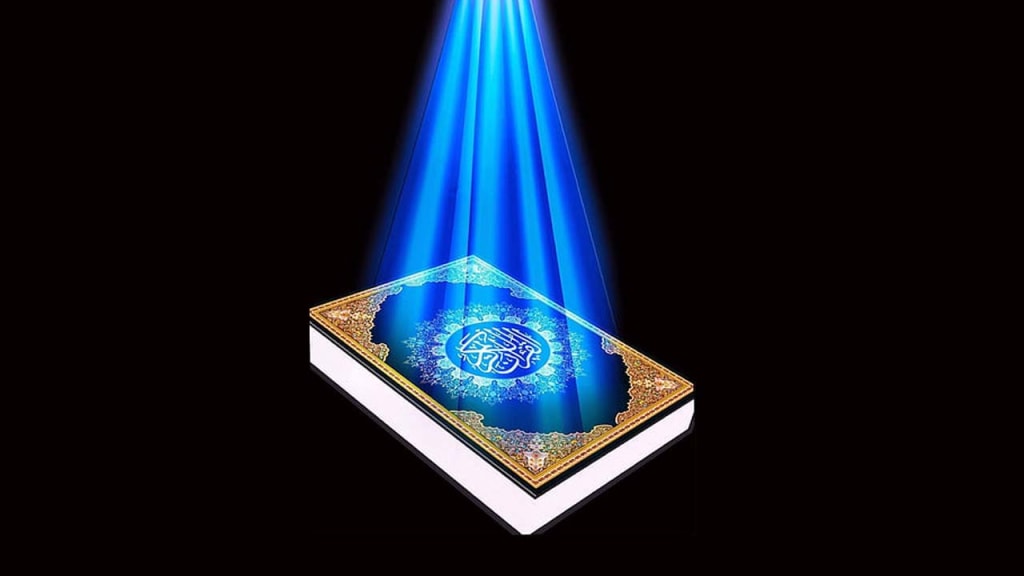
The Quran, the holy scripture of Islam, is believed by Muslims to be the literal word of God as revealed to the Prophet Muhammad (peace be upon him) through the angel Gabriel. The Quran's authorship, however, is fundamentally different from conventional human authorship.
Muslim Belief Regarding Authorship:
1. Divine Origin: Muslims believe that the Quran is not the work of any human author; rather, it is the direct and unaltered word of God (Allah). It is considered the final and complete revelation to humanity and serves as a guide for all aspects of life.
2. Revelation to the Prophet Muhammad: The Quranic revelations began in the year 610 CE when the Prophet Muhammad received the first revelation while meditating in the Cave of Hira near Mecca. Over a span of 23 years, these revelations continued, addressing various issues, moral guidance, and laws.
3. The Role of the Prophet: While the Prophet Muhammad was the recipient of these divine revelations, he did not write or author the Quran in the conventional sense. He conveyed the revelations to his companions, who memorized and recorded them in writing on various materials like parchment, palm leaves, and bones.
4. Compilation During Caliphate: The compilation of the Quran into a single, unified book took place after the death of the Prophet Muhammad, during the Caliphate of the third Caliph, Uthman ibn Affan, around 650 CE. Uthman ordered the compilation to ensure the preservation of the Quran in its original form, with all variations and dialects reconciled.
5. Preservation of the Original Text: Muslims believe that the Quran has been preserved without any alteration, addition, or omission since its revelation. It remains in its original language, Arabic, and is recited, memorized, and studied by millions of Muslims around the world.
6. Human Scribes: While the Quran is considered the direct word of God, the Prophet Muhammad's companions served as scribes, recording the revelations under his guidance. These companions ensured that the revelations were preserved accurately.
7. Linguistic Miracle: The Quran is also considered a linguistic miracle due to its unparalleled beauty, eloquence, and depth of meaning in the Arabic language. It is often cited as evidence of its divine origin.
The Quran, the holy scripture of Islam, is an unparalleled literary masterpiece that transcends human authorship. Its divine origin and unique characteristics make it a source of deep reverence and study for Muslims worldwide.
One of the most remarkable aspects of the Quran is its linguistic and literary excellence. Muslims believe that the Quran is not only a divine revelation but also a linguistic miracle. Its Arabic text is considered the pinnacle of eloquence and style, challenging the finest poets and orators of its time, and it continues to do so today. The Quran's ability to convey profound spiritual and moral truths through its linguistic beauty is a testament to its divine origin, as Muslims believe that God's wisdom and guidance are reflected in every word and verse.
Furthermore, the Quran addresses a wide array of topics, ranging from theology and law to morality and guidance for personal conduct. Its verses cover the creation of the universe, the stories of past prophets, the nature of God, and the ethical principles that should govern human behavior. It provides a comprehensive worldview that guides Muslims in all aspects of life.
The Quran's impact on individuals and societies throughout history has been profound. Its teachings have inspired countless individuals to embrace Islam, and its ethical principles have laid the foundation for just and compassionate societies. The Quran has been a source of solace and guidance for Muslims facing personal challenges, and its call for justice has led to social reforms in various parts of the world.
In conclusion, the Quran is a divine revelation that transcends human authorship. Its linguistic beauty, comprehensive guidance, and profound impact on individuals and societies are a testament to its status as a timeless and unparalleled scripture. For Muslims, it remains the ultimate source of spiritual enlightenment and moral guidance, serving as a compass to navigate the complexities of the world and seek closeness to God.
In summary, Muslims believe that the authorship of the Quran lies with God, and the Prophet Muhammad served as the intermediary through whom these revelations were conveyed to humanity. The Quran's preservation and integrity are foundational beliefs in Islam, and it continues to guide the lives of Muslims around the world as a source of spiritual and moral guidance.
About the Creator
Abdullah Rajon
Experienced content writer skilled in SEO optimization, research, and deadline-driven delivery. Let's create engaging content together!






Comments (1)
Very interesting! I love learning new things! Great work!